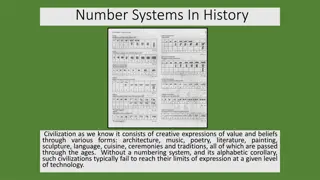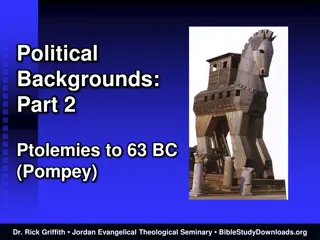Jewish Historical Timeline Through Biblical Prophets and Book Events
This historical timeline delves into the Jewish history dating back to 1500 BC with figures like Moses and King Saul, leading to the establishment of the United Kingdom under Saul, David, and Solomon. It progresses to the rise of the Assyrian Empire, division of the kingdom, Jonah's preaching in Nin
4 views • 20 slides
Ancient Astronomy and Cosmologies Across Different Civilizations
Ancient civilizations like Babylonian, Assyrian, Egyptian, and Chinese had profound knowledge of astronomy, including tracking celestial events, developing calendars, and recording astronomical phenomena. The Greeks contributed to cosmology, contemplating the nature of the cosmos. Beliefs in a spher
2 views • 28 slides
Number Systems In History
Civilizations throughout history have expressed their values and beliefs through various creative forms like architecture, music, and literature. The development of numbering systems played a crucial role in advancing society's ability to communicate, track records, and engage in trade. From the ear
1 views • 17 slides
Understanding Islamic Beliefs on Life After Death in KS4 Curriculum
Explore the key Islamic beliefs surrounding life after death in the KS4 RE curriculum, focusing on concepts such as Akhirah, human accountability, and heavenly realms. Engage students through activities like storytelling, discussions on angelic scribes, and designing diagrams to illustrate Islamic v
0 views • 7 slides
Insights into Daniel's End-Times Prophecy and Visions
Explore the profound insights of the Book of Daniel, unraveling the backbone of end-times prophecy and key events like the Babylonian captivity, Nebuchadnezzar's dream, practical lessons, and visions of the four beasts. Uncover the divine revelations on kingdoms, the ancient of days, son of man, the
0 views • 17 slides
Historical Overview of 1st Maccabees: Key Events and Characters
The content provides a historical background on the book of 1st Maccabees, focusing on key dates such as the return from Babylonian captivity, construction of the Temple, and the reign of Alexander the Great. It introduces important figures like Mattathias and his sons, highlighting their role in re
2 views • 34 slides
Ancient Flood Narratives: Sumerian, Babylonian, and Hebrew Accounts
Ancient flood narratives from Sumerian, Babylonian, and Hebrew sources depict stories of divine displeasure, flood planning, and survival through boat-building. Enlil, Enki, and Yahweh play key roles in warning individuals like Uta-napishtim, Atrahasis, and Noah to build boats and save life forms du
0 views • 8 slides
Evolution of Musical Notation Systems and Contexts
Explore the diverse world of musical notation systems, from Eastern to Western traditions, spanning Babylonian notations, Guido d'Arezzo's contributions, Gregorian chants, and modern-day tempo measures. Uncover the rich history and nuances of musical expression through various scales, staves, orname
0 views • 12 slides
Daniel's Prayer of Repentance: Seeking Forgiveness and Restoration
Daniel's prayer of repentance in Daniel 9:1-19 serves as a beautiful example of confession of sin and seeking forgiveness. Set in the first year of Darius, son of Ahasuerus, around 538 BC, the prayer is prompted by Daniel's knowledge of Jeremiah's prophecy regarding the Babylonian captivity. With a
1 views • 18 slides
Understanding the Beatitudes and Commandments in the Kingdom of Heaven
The Beatitudes and commandments reveal the character expected in the Kingdom of Heaven, emphasizing righteousness surpassing the scribes and Pharisees. They highlight the importance of internal righteousness, guided by the Holy Spirit. Jesus emphasizes the seriousness of actions like anger and lust,
0 views • 14 slides
Evolution of Numerical Systems: From Pale Blue Dot to Babylonian Numbers
Tracing back to the Pale Blue Dot photograph of Earth, discover the evolution of numerical systems from scratch marks on bones to sophisticated Babylonian base-60 system. Sumerians used tokens for counting, leading to the birth of arithmetic, while Babylonians utilized a positional number system. Ex
0 views • 41 slides
Understanding the Context of Matthew 23:16-24 and the Strain of Gnat and Swallow of Camel
In Matthew 23:16-24, Jesus rebukes the scribes and Pharisees for prioritizing trivial matters over justice, mercy, and faith. The metaphor of straining a gnat and swallowing a camel illustrates their hypocrisy and neglect of important matters. The passage emphasizes the importance of upholding signi
0 views • 10 slides
Exploring Matthew 5:17-48: The Call to Greater Righteousness
Delve into the profound teachings of Matthew 5:17-48 where Jesus emphasizes the importance of fulfilling the Law, the call to a righteousness surpassing that of the scribes and Pharisees, and the transformative power of addressing anger and lust in one's heart. Discover the profound insights on livi
0 views • 16 slides
The Fulfilled Promise in 2 Samuel 7:8-13 - Joash the Boy King
God's promise to David in 2 Samuel 7:8-13 is fulfilled through the reign of his descendants up to the Babylonian Captivity and the eternal reign of Jesus. One of these descendants, Joash, the son of Ahaziah, became the king of Judah, despite challenges such as the rise of Athaliah. Joash's journey,
0 views • 9 slides
Unraveling the Mysteries of Ancient Babylon and Polygons
Delve into the intriguing history of ancient Babylon and its influence on our numerical systems, from the concept of polygons to the origin of 360 degrees in a circle. Explore the significance of base 60, Babylonian writing methods, and the enduring legacy of Babylonian scribes. Uncover how Babylon'
0 views • 32 slides
Ancient Empires and Biblical History Timeline
Explore the political backgrounds from the Ptolemies to Pompey in 63 BC, including details on geographical locations in Acts and Epistles, the order of empires such as Greek, Babylonian, Assyrian, Roman, and Medo-Persian, developments during the Assyrian and Babylonian rules, Persian era returns, an
0 views • 38 slides
Ptolemaic Land Surveys: Insights from Edfu Survey and Related Operations
Explore the intricacies of Ptolemaic land surveys, with a focus on the Edfu land survey conducted by Katelijn Vandorpe. Delve into main survey operations such as cadastral surveys and crop reports, discuss nome surveys at village levels, and analyze topographical land surveys highlighting personal d
0 views • 16 slides
Overview of the Inter-Testamental Period and Key Events
The Inter-Testamental Period covers significant historical events including the fall of Jerusalem, Babylonian Captivity, Jewish Return, temple rebuilding, Alexander the Great's conquests, and the impact of rulers like Antiochus IV Epiphanes on Jewish practices. This era sets the stage for understand
0 views • 29 slides
Ancient Civilizations and Historical Figures Overview
Explore the early eras of human history, from prehistoric times and the Old Stone Age to the rise of ancient cities like Catal Huyuk. Learn about the significance of scribes, nomads, and the Paleolithic period. Delve into the realms of archeology, Neolithic advancements, polytheism, and bureaucratic
0 views • 20 slides


















